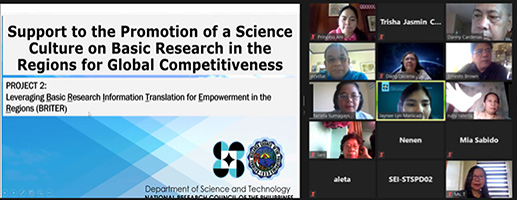 Two of the important key elements in the advancement of a country are technology and innovation, which are results of research and development. Recently, the Philippines’ ranking in the Global Innovation Index (GII), among 131 economies, climbed up from 100th in 2014 to 50th in 2020. This is quite an improvement in science, technology, and innovation (STI) of the country despite the very low share of R&D expenditures to GDP.
Two of the important key elements in the advancement of a country are technology and innovation, which are results of research and development. Recently, the Philippines’ ranking in the Global Innovation Index (GII), among 131 economies, climbed up from 100th in 2014 to 50th in 2020. This is quite an improvement in science, technology, and innovation (STI) of the country despite the very low share of R&D expenditures to GDP.
To continually support STI development of the country, the DOST-funded and DOST-PCAARRD monitored three-year program, “Support to the Promotion of a Science Culture on Basic Research in the Regions for Global Competitiveness,” was approved for implementation by the National Research Council of the Philippines (NRCP).
Under this program are two component projects: “Project 1. Frontier Research Agenda and Capability Building of Researchers in the Region: NRCP Science and Technology Expert's Pool (N-STEP)” and “Project 2. Leveraging Basic Research Information Translation for Empowerment in the Regions Program (BRITER).” The program targets to improve and strengthen global competitiveness of the country in the science and technology sector.
In an online inception meeting held last July 24, 2020, Dr. Marieta Sumagaysay, NRCP Executive Director, said the program proposal was crafted primarily to strengthen NRCP’s performance of its mandate. Also, in support of DOST's direction in strengthening regional R&D and S&T services, the program through the N-STEP project, targets to establish NRCP regional clusters (North and Central Luzon, South Luzon, Visayas, and Mindanao) to increase the basic researchers and scientists based in the regions.
Specifically, the project aims to: 1) develop a national network of researchers and increase the number of researchers, scientists, and engineers (RSEs) from the regions; 2) increase R&D spending on basic research in the regions by having local RSEs undertake critical researches in aid of science-based policy making and program design that are responsive to the location-specific needs of the regions; 3) capacitate RSEs who could help universities maximize their contribution to regional growth and building partnerships with the industry and different sectors of society; and 4) improve the scientific performance of RSEs in the regions in terms of publications, policy advisories, and similar other outputs.
Meanwhile, the BRITER project was conceptualized in response to DOST Secretary Fortunato dela Pena’s directive “to find ways on how stakeholders/prospective users can utilize the results of NRCP’s basic research.” This will be done through capacity building of researchers in the regions; promotion of a culture of science by translating basic research information into forms (publications, policies, patents, partnerships, and products) that can be utilized by different stakeholders from the academe, government, industry, and community sectors.
There are three major components under the BRITER project: 1) Basic Research for Informed Policy-Making (BRIP). This component will focus on the inventory of terminal reports of completed NRCP-funded research in the last 10 years (2008-2017); 2) Enhancing the Science Culture for All (ESCA). ESCA targets to translate scientific knowledge from the NRCP basic science researches into widely-attractive formats; and 3) Support to Research Dissemination in Local and International Platforms-this will give local researchers an opportunity to present their research results locally and abroad.
Once the program is completed, NRCP envisions to be the national source/pool of researchers, scientists, and engineers (RSEs) in the country.
The online inception meeting was initiated by the PCAARRD-Socio-Economics Research Division (SERD) with 23 participants, including the Program Leader and NRCP Executive Director, Dr. Marieta B. Sumagaysay, PCAARRD-SERD Director, Dr. Ernesto Brown, PCAARRD Institution Development Division Director, Dr. Fezoil Luz Decena, and S&T consultants, Dr. Danilo Cardenas and Dr. Edwin Villar. The program officially started on June 1, 2020 and will be completed in May 2023.
